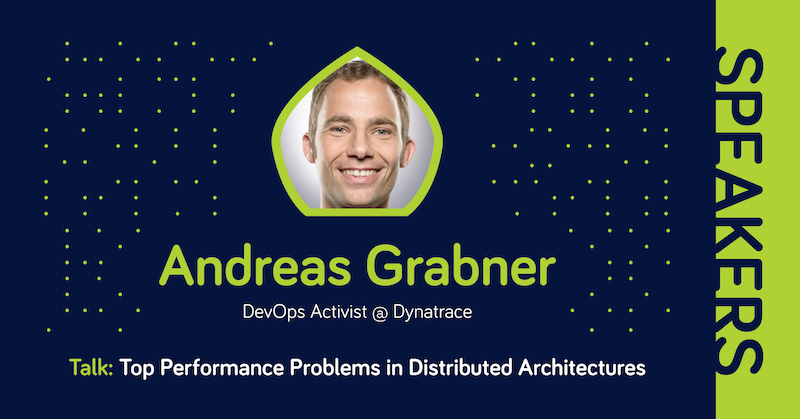
Andreas Grabner: Developers have to become "Performance Aware"
Spring is here so it is the perfect time to start getting to know the speakers at the 4th edition of DevExperience. And why not to start with some happy salsa steps, coming from Andreas Grabner, our first speaker on blog?
Well, it is true that Andreas has a huge passion for salsa, but he is here not for salsa lessons, but to bring some extremely useful information on Top Performance Challenges in Distributed Architectures.
We sent Andreas some questions to get to know him better and to find out more about his talk, so here is the first interview from the 4th edition of DevExperience!
DevExperience: What did you want to become when you were a child?
Andreas: I watched Indiana Jones as a kid and that made me want to become an archeologist.
DevExperience: What is your advice for a junior who wants to develop a career in IT?
Andreas: Not only be curious in technology but also put yourself into the shoes of the end user that benefits from your software -> this ultimately allows you to build software that really makes an impact!
DevExperience: How does a normal day looks like for you? What about a not so normal day?
Andreas: I travel about 70% of my time – so – a normal day often means I am somewhere and not home. Overall I have a lot of interactions (email, zoom…) with our partners and customers.
I analyze a lot of data, try to help folks leverage monitoring data in a smarter way and then write & talk about it. So – I spend a lot of time in Word and PowerPoint to get my learnings into a format I can use for blogs or presentations.
I also promote my learnings through a YouTube channel and a Podcast I am running with a colleague. And while I am not doing that I try to explore the salsa dancefloors in the places I visit. I think that’s about it as I cant think of a not-so-normal day – I just try to make what I really love into my every day normal day
DevExperience: How would you explain to an old lady who knows nothing about technology what is it exactly that you do?
Andreas: I would tell her this: Remember when you used Kodak cameras to take pictures of your grand kids? Nowadays Kodak’s are nowhere to be seen because your grand kids are taking pictures with their mobile phones?
In my job I work with companies and help them to embrace the latest technology so that they stay relevant in the future and don’t repeat the Kodak mistake!
DevExperience: How did you end up knowing so much about performance? What attracts you to it?
Andreas: My second job was for a company that built performance testing tools. I had several great mentors in that company that got me excited about performance and I could apply it right away by using our own tools and help companies to improve the performance of their software!
DevExperience: What are the most common problems you see from monitoring systems?
Andreas: The classical distributed problem patterns such as too chatty (too many calls to a database, too many calls to a microservice), requesting and processing too much data that is actually not needed, incorrect configuration of pools & queues … - check out one of my recent talks on this!
DevExperience: From the systems you are monitoring do you see companies moving towards containers and orchestrators or there are still many VMs in production?
Andreas: My current focus is working with the large cloud and PaaS vendors and because of that also working with companies that are already or have already moved to containers and deploy them on platforms such as Kubernetes, OpenShift or CloudFoundry.
So yes: I see it every day! But – the same companies still have a lot of stuff running in VMs as well!

DevExperience: Also do you see an increase in serverless systems deployed live?
Andreas: I do – but – I also see that the big hype from last year slowed down a bit. Could also be that Kubernetes is simply taking over the whole cloud native space in the moment. Nevertheless – Serverless is a hot topic and I see it being adopted more and more.
DevExperience: If you were now the architect of a new product, would you invest in serverless, a kubernetes platform or just start a simple monolith and throw it on a number of VMs?
Andreas: That completely depends on what we are going to build – how fast we have to have a minimum viable product and how much of the future state of the product is known.
My gut feeling tells me though that I would build containers that I can run on kubernetes. It gives me a lot of options on how to implement my services, I have a huge ecosystem and I can choose where I want to deploy it to.
DevExperience: So it looks like everything is shifting left now: operations (like devs creating alerts, doing on call etc), security and now performance. Are we going to be super-developers, to know it all? How can we keep the pace with all these changes?
Andreas: Very good question: well – I think the best developer is one that understands all the impacts he/she can have with his software. Performance is definitely part of this. But – this doesn’t mean that everyone has to become a super performance engineering hero.
I think developers have to become “Performance Aware” which means they need to understand the core performance and scalability principles of software they are building. Fortunately we have a lot of tooling that is now fully integrated into our build pipelines so that the heavy lifting (collecting and analyzing data) is mostly done fully automatic.
DevExperience: Tell us more about the main ideas of your talk at DevExperience! Why should people register and attend the event?
Andreas: I kind of eluded to this in one of the previous answers. I gave a similar talk last year, and the year before, and the years before.
The shocking thing for me is that I am still talking and showing very similar performance problem patterns that I have seen back in the days when I analyzed monolithic java & .net applications. Now I see the same patterns in distributed microservice architectures with often much bigger implications than before, e.g: calling services that charge by invocation (kind of what we had to do in the mainframe times), or services that run on hardware that belongs to somebody else and we get charged by every additional byte we transfer or put into memory.
I suggest everyone to sign up for my talk who want to become a more “Performance Aware” developer by avoiding some of these patterns that have been out there for many years. I hope that developers will start writing better performing code in the future so that I can finally talk about something else.
We are pretty sure that you want to help Andreas talk about something else in the future, so all you have to do is come to DevExperience and learn about what he has to say on this topic, then implement. You can register online here and you would better do it fast, if you want to make sure that you will get your seat on April 19. Andreas and the other amazing speakers are waiting for you at the 4th Gathering!
